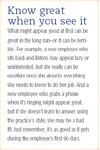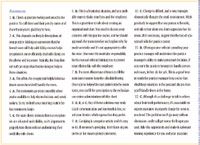Are you a great employee?
You're fabulous, of course, but are you doing enough to really shine?
She's a loyal, dedicated team member. He has strong technical skills. She works well with others. He's book smart and always gets the job done. She's analytical and detail-oriented. He always pleases clients and takes the next step to make everyone's day run more smoothly.

There's no single formula for what makes a great team member. The traits one boss loves may not be the same skills another employer values. So a big part of being great is asking what your boss expects, then doing more.
Do you know what your boss expects? It starts with a job description and a hospital policy manual. If your practice doesn't have these tools, you may need to volunteer to help create them. After all, when you're great, you'll find—or create—an environment that encourages everyone to be great and explore their greatness.

Debbie Allaben Gair, CVPM
For example, you might approach your boss with a request that speaks to his or her priorities. If your manager places high value on creating a team that works together happily, you might say, "I know you like our team to work well together, and I think we could be happier if we understood your expectations. Could I help you develop job descriptions for each of our roles?"
Of course, if you work in a great practice, it's much easier to be great. And a great team needs a variety of great team members. We can't all be the starring role, but if we're good at supporting other team members, that's a version of excellent. Let's take a look at the traits that make team members great—and not so great.

My recipe for a great employee
Skills aren't enough
We've all probably known at least one technically skilled team member with a bad attitude. Simply put, you may be a topnotch scheduler, a whiz at placing catheters, or the queen of inventory. But without the right attitude, all of those skills don't add up to great. Consider these examples:
• Great skills, poor attitude and teamwork. Jenny thinks she's indispensable, and because she's worked at the practice for a long time, Dr. Smith thinks so, too. Dr. Smith is convinced his practice can't survive without Jenny's skills. What he doesn't know: Jenny holds other team members back. In fact, Jenny drives away truly great employees because they know they can't thrive at this practice.

3 tips to hire great
Jenny can become a great employee, but she needs to be motivated to change. Her manager can create a motivating environment with performance reviews, employee support and education, and progressive discipline, but Jenny must make the choice to change.
• Good skills, great attitude and teamwork. Lisa's a client service pro and she works well with others on the team, but she misses key details. Other team members feel frustrated because they must always double-check her work for mistakes. Ruth, the practice manager, appreciates Lisa's client service skills, but once in a while, others must pick up the pieces behind her. Lisa's a good employee, and with focus, she can become a superstar.
Ruth meets with Lisa to discuss her performance. She asks Lisa to think about these questions: How can you help yourself improve? How can we help you improve? What do you need to reach the next level of greatness at our practice?

Know great when you see it
Then she asks Lisa to draft a plan to grow and outline specifics, from training and continuing education to schedule and benefit questions. Ruth and Lisa discuss their ideas, and Ruth documents the meeting and sets a time to check Lisa's progress.
• Good skills, good attitude and teamwork. Liz arrives at work on time, all the time. She works well with other team members and with clients. She joins the team for the holiday celebration, but she doesn't go to the ball game outings. We know that we can count on her, because she is a Steady Eddy. Sometimes she'll cover for other employees, but she rarely needs others to cover for her. She's the glue that holds the team together, but we don't even know she's doing it.
Liz doesn't stir up trouble, and she doesn't stand out as a superstar at work. Team members and clients appreciate her and count on her to be the steadiness needed in an unsteady environment. She's loyal, kind, and patient. Viewed separately, Liz's skills simply seem good. But her winning combination of good skills and a good attitude make her one version of a great employee. Now let's look at another.
• Great skills, great attitude and teamwork. Heather's the practice superstar. Everyone loves her and loves being around her. Heather sees through what clients say and reads into what they mean. Consider this example. When Heather asks Mrs. Johnson, "How was your visit today?" Mrs. Johnson answers with an unenthusiastic, "Fine." Heather responds with a phrase like this: "It seems that things aren't fine. Is there anything more that you can tell me about your visit?" Or, "Can I call you after you leave and ask you how your visit could have been better?" Perhaps Heather notices Mrs. Johnson spent a while waiting in the exam room when the doctor finished up with another client. Heather might say, "I noticed that you had to wait a long time. Thank you for your patience."
From good to great
What's the difference between a good employee and a great one? A good team member knows her job description and does her job well. She shows up on time and leaves when the work is done. She helps offer high-quality care, and she listens and participates in staff meetings.

Test your team
A great employee not only diffuses difficult situations, she listens and resolves issues beyond the client's expectations. She also problem solves issues during staff meetings with a positive, supportive attitude. She's committed to the practice. It's not just a job; it's a job that she loves. Co-workers and clients know it because they feel it. At first, a great employee might be a good listener and a good follower. After training and some experience at the practice, a great employee would be a good speaker and trainer and a good leader.
Being a great employee is satisfying. It's about reaching for the next big challenge and learning from others. It's the right thing to do—and it feels great.

Answers:
Debbie Allaben Gair, CVPM, is a Firstline Editorial Advisory Board member and a management coach, recruiter, and educator. She works with veterinary practices that help people work together more effectively. Please send questions or comments to firstline@advanstar.com
Newsletter
From exam room tips to practice management insights, get trusted veterinary news delivered straight to your inbox—subscribe to dvm360.